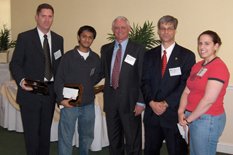News Story
Clark School Researchers Are Top Inventors

John Fisher, Parth Modi and Jennifer Lynn Moreau accept the 2005 Life Science Invention of the Year award from UM Division of Research Vice President Jacques Gansler and OTC Executive Director James A. Poulos III.
Each of the projects is the product of a team including a Clark School of Engineering student, professor or both. The prestigious awards help to transfer information, life and physical science inventions developed at the university to business and industry. The awards were announced at a reception last night at the University of Maryland Golf Course.
Physical Science Invention of the Year
The winning team in this category has developed a patent-pending technology that for the first time can produce hydrogen from hydrocarbon fuels without the high levels of carbon monoxide that traditionally occur in this type of process. The majority of commercial hydrogen is produced from hydrocarbon fuels.
Clark School Assistant Professor Gregory S. Jackson, mechanical engineering, was part of team along with UM Prof. Bryan W. Eichhorn and graduate student Shenghu Zhou.
Life Science Invention of the Year
The team that garnered the top prize in the life science category has produced new, patent-pending biomaterials for tissue engineering that avoid problems with premature degradation associated with previous materials developed for growing new cells within the body.
Clark School Assistant Professor John P. Fisher and students Parth Modi and Jennifer Lynn Moreau, all chemical and biomolecular engineering, accompanied UM alum Sachiko Kaihara on this team.
Information Science Invention of the Year
Clark School Assistant Professor Maria I. Klapa and graduate assistant Harin Kanani, both of the chemical and biomolecular engineering department, won in this category for a patent-pending metabolomics technology that enables highly accurate and simultaneous measurement of hundreds of metabolites (e.g. glucose, amino acids) in biological systems, for uses such as early disease diagnosis, personalized nutrition and medicine, functional genomics, and safe use of genetically modified food.
Their new technology helps eliminate errors that are often produced through current metabolomics technologies. The pair also garnered the runner-up prize in the UM $50K Business Plan Competition on April 7.
Award for Entrepreneurship
NetImmune, Inc., a start-up developed by UM inventors from the Clark School's Department of Electrical and Computer Engineering (ECE) and the Institute for Systems Research (ISR), was presented with this award, sponsored by the Maryland Technology Development Corp. (TEDCO).
The company, which develops products to protect internet networks by mimicking human immune system responses, is a past winner of the UM $50K Business Plan Competition (2004) and a MIPS-funding recipient (2005). The researchers involved are ISR-affiliated Professor Mark Shayman, and Mehdi Kalantari Khandani, an assistant research scientist with ECE.
The Office of Technology Commercialization (OTC) at the University of Maryland was established in 1986 to facilitate the transfer of information, life and physical science inventions developed at the university to business and industry. In the past 19 years, OTC has recorded more than 1,500 technologies, secured more than 225 patents and licensed nearly 750 technologies, generating more than $22.6 million in technology transfer income. In addition, more than 40 high-tech start-up companies have been formed based on technologies developed at the university. See www.otc.umd.edu.
Published April 11, 2006









